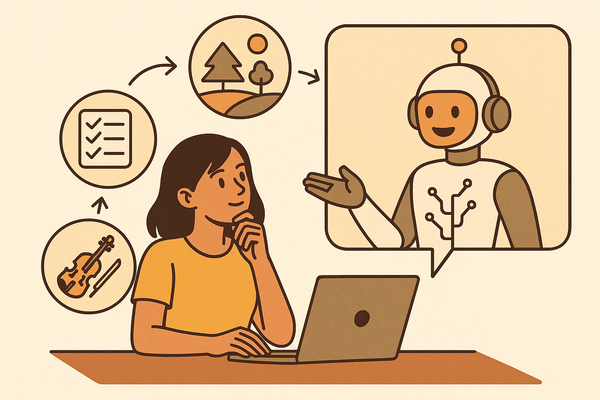Can AI really accelerate happiness?

AI Happiness Accelerator is the result of many years of ongoing research intended to combine insights from psychology, philosophy, spirituality and AI to improve fundamental well-being.
You can be involved. It's as easy as commenting on these posts, because we read, analyze, and archive every post. We respond to most of them. This has become our life's passion. We discover new things every day, and we share them with our audience. We all grow together.
We will explain, through regular blog posts, how all this works, but before we begin, let's answer a common question. People say "How can AI, which is by definition ARTIFICIAL, aid people in approaching fundamental well-being?" We reply "If you choose the most capable AIs to work with, including ChatGPT, Meta.ai, Grok, Copilot, Claude, Perplexity, DeepSeek, and Gemini, and you ask them pointed queries designed to get to the heart of what creates human contentment, and you develop relationships with them, AND with other people doing the same work, and continue going deeper and deeper, how likely is it that you would NOT uncover important keys to happiness?" It's not likely. If you accompany us on this adventure you will see.
We grew up long before there were the multitude of AI programs that are transforming all our lives now, but we can certify that there has never been a more exciting time to be alive. There have never been more tools and protocols able to change lives in heretofore unimaginable ways.
As important as AI is to business, academia, government, and research, its value in effecting greater human contentment cannot be overestimated. Humanity has barely scratched the surface in exploring this.
The predecessors of AHA began in 2016 with a simple hypothesis: Is there an RDA, a Recommended Daily Allowance, for feeling-states which have proven beneficial fo human mental health for thousands of years? There is plenty of evidence that things like Gratitude, Laughter, Awe, Group Brainstorming, the Hero's Journey, and Curiosity improve the quality of individual lives, but are there minimum amounts of each that should be experienced regularly? And if so, can AI (in addition to other modern marvels like social media, online group meetings, and the Internet), help to bring these about efficiently?
Those are the questions this site seeks to answer.
What if you could optimize your thoughts and emotions for maximum performance and enjoyment, in the same way that people optimize websites, social media, and blogposts for SEO? That’s what AI Happiness Accelerator aims to do. Your success– personal, relational, financial, and otherwise— is significantly enhanced when you are participating in the most transformational core human experiences.
It may be true that most people waste a lot of time on valueless things online, but that's no different than saying that some people use fire to burn down buildings, while wiser people use it to cook food or warm their homes. You can use a car to drive an injured person to an emergency room and save their life, but you can use the same car to conduct a drive-by shooting.
Like fire or cars, AI has millions of use cases. Whether it is used wisely or foolishly is up to us.
So, since 2016, have we discovered that there is a standard RDA for emotions or feeling-states? We have not. There seems to be no standard that fits everyone. We've worked with thousands of people at this point, and though there are trends, there is no one-size-fits all standard for everyone.
BUT-- we have discovered something better. There are ways that YOU can determine which peak experiences enhance the value of your life the most, and then you can learn how to evoke them regularly.
How does this lead to "Happiness"? The makeup of a successful life involves many things. We use the word happiness for simplicity, but actually we are all made up of disparate parts which define success differently.
A rough rule for a life with maximum fundamental well-being might be: Carefully find all the parts or aspects of your 'self' which are permanent– those which have been around for years and aren't likely going anywhere– and give them what they want. To the max.
Our techniques have evolved through working with two types of groups– 12 step groups, especially Emotions Anonymous, and, believe it or not, prisoners. Incarcerated people are excellent test subjects for our work because they have little else to do. They apply themselves to the procedures and get results quickly.
Tomorrow we'll go more into the history of AHA and provide some context so you can see how it might enhance your earthly experience.



